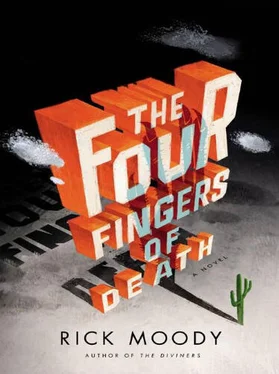In our case, the lead surgeon was called away from a floodlit driving range on Bureau of Land Management preserves, there in Southern Arizona. The engine of the ambulance had scarcely cooled before he was scrubbed and began bombarding his surgical tools with gamma radiation, in order to prevent antibiotic-resistant menaces. Interns and residents gathered around the operating table and in the theater above. George’s body cooled. His O-positive blood began to drain from the corpse via a pump that resembled an old-fashioned concertina. The residents flushed his arteries with a preservative that insured George’s lungs would not decay, and then they inflated them slightly, in the hope that these organs would resume function once inside Tara’s chest. They cut in all the many places that they needed to cut. And they slid the excised lungs onto plastic liners, and then they fitted these liners into a pair of six-pack holders that people used more often to take beer to picnics. Then they were ferried to URB in helicopters that were ready to scramble for medical emergencies in the desert.
Meanwhile, we were still in the driveway: “We’re not waiting for the Rodriguez kids to get back! I’m calling an ambulance!” “I don’t want an ambulance!” “You’re not thinking clearly! You only have twenty percent of lung capacity! And if the lungs aren’t in your body in six hours, then we have to wait for the next available set of lungs! I don’t give a rat’s ass if the surgery is making you uncomfortable! I don’t care if all the neighbors see! We’re getting an ambulance!” At which point Tara started crying, and I could hear her choking through the oxygen mask, and this naturally made me upset, because I genuinely hated it when my wife cried, which she nonetheless did regularly, because her disease, this scourge, had robbed her of her youth, had robbed her of the time in her twenties when she should have been sleeping around or doing a lot of drugs or at least smoking copiously. Even in college, she’d told me, she’d had to hang upside down for a while in the morning, while her roommates smacked her around to get her lungs going. This, in fact, was when I met her, when I was teaching a beginning writing course at the community college. She audited one night with a friend, and brought her rolling tank with her.
Do you require an even more detailed portrait of the beloved? If I were to fashion a more complete account, its title would be “Portrait of a Disabled Gambling Enthusiast.” Which may surprise you. But after a certain age this was Tara’s daily activity. Yes, in case you were wondering, even disabled people who are slight, beautiful, and possessed of an ethereal wasting quality can be willful, short-tempered, and self-destructive. You can become a little bit impatient with them even as you are convinced you would lie down across the local freight railroad tracks to prevent them further harm.
Tara apparently began by betting on sporting events while in college. Maybe because she was no longer able to participate in sports. (She had once been a teenage gymnast — her specialty was the balance beam.) In her own account of her gambling addiction (beginning about 2016), she too began with baseball, precisely because it had a record of more than a decade of tolerance for differently abled players. She wanted to bet on players like Dave McClintock and Juan Millagro. And making use of various online gambling forums, Tara did begin to place small wagers, using especially her disability allotments from the government. On several occasions her parents, a stiff, religious couple from the Midwest, bailed her out of her debts.
When she began betting on far more unsavory things, and making use of underworld professionals for the purposes of betting, things got worse. About the time she audited my writing class, where her luminous mortality, her consumptiveness, was both terrifying and strangely alluring, she was, by her own account, also showing up at the backroom offices of local bookmakers, wheezing on her respirator, intending to bet on the outcome of World Wrestling Federation matches, cockfights, and NASCAR. She wrote a couple of short stories about the gambling demimonde, and these stories, with their colorful argot, were of the transparently autobiographical sort that I always think makes for the finest art. She probably had more talent than I. Were Tara not preoccupied with dying, inch by inch, and with chasing down her every gambling whim to the best of her motorized ability, I believe she would have made the better writer. Alas, she had little interest in preserving her autobiography. I told myself that I should have nothing to do with her, and then I fell for her — the dreamer falling for his dream.
The Futures Betting Syndicate, which became a national obsession in the teens, about the time our class ended, was effectively niche-marketed to a temperamental beauty with a life-threatening pulmonary disease and parents who would fund her. With the emergence of the FBS, Tara had found, at last, a gaming institution that had the veneer of popular acceptance. The FBS was overseen by government regulators, and a tenth of its profits were creamed off for education, entitlement programs, and servicing the trillions of our national debt.
The FBS, as you know, created the very first subsidized futures markets organized around current events, around a host of possible outcomes, such as the likelihood of Republican control of the House of Representatives, the assassination of the newly elected prime minister of Palestine, the liquidation of the remaining portion of the Greenlandish ice shelf, and so on, and while it was notoriously bad as an indicator of actual outcomes, particularly when predicting the volatility of any season’s weather, it was quite useful as a barometer of opinion. As the popularity of the FBS increased, and as its revenues began to help the government work its way out of gargantuan funding obligations, its no-holds-barred laissez-faire market expanded into some rather odd directions. This was where Tara particularly liked to concentrate her attention. When we were dating she used to tell me these things: in one rather grisly period, in her account, she made several thousand dollars betting on the possibility that the secretary of federal gambling enterprises (titular head of the FBS) would be badly beaten in his own home. It was unclear who had first created this particular market, and the secretary’s detail of Secret Service agents was unable to stop the attack. Tara then bid on the likelihood of Israel’s use of a nuclear weapon on one of her neighbors. Again, Tara’s certainty was well-founded, as you know.
Her talk was of upticks, bid quantities, micro-reversals in numbers of casualties in tribal conflicts, and, almost quaintly now, of sports. I was, in this period, uncertain if living with her, as I was longing to do, was going to be easy under the circumstances. True, any good sufferer of gambling para-addiction syndrome with socially unacceptable perspiration feature (see the Diagnostic and Statistical Manual of Mental Disorders — Eighth Edition , or DSM-VIII ) will confess to having given the FBS a try occasionally. I tried it later myself, mainly when Tara was asleep, which was during the day, because she liked to draw the blinds and stay up all night by herself. Thus, during the day, I attempted a few stray bids, based on a single betting strategy that I referred to as radical positivity . I bet only on really splendid things taking place in the world. I bet that the Fifty Years Insurgency in Sri Lanka would end within the month. I bet that doctors would find a cure for hantavirus. I bet that the greenhouse effect would suddenly be reversed, that Russia and Ukraine would stop all the carnage. In this way, I lost most of my IRA.
Читать дальше












